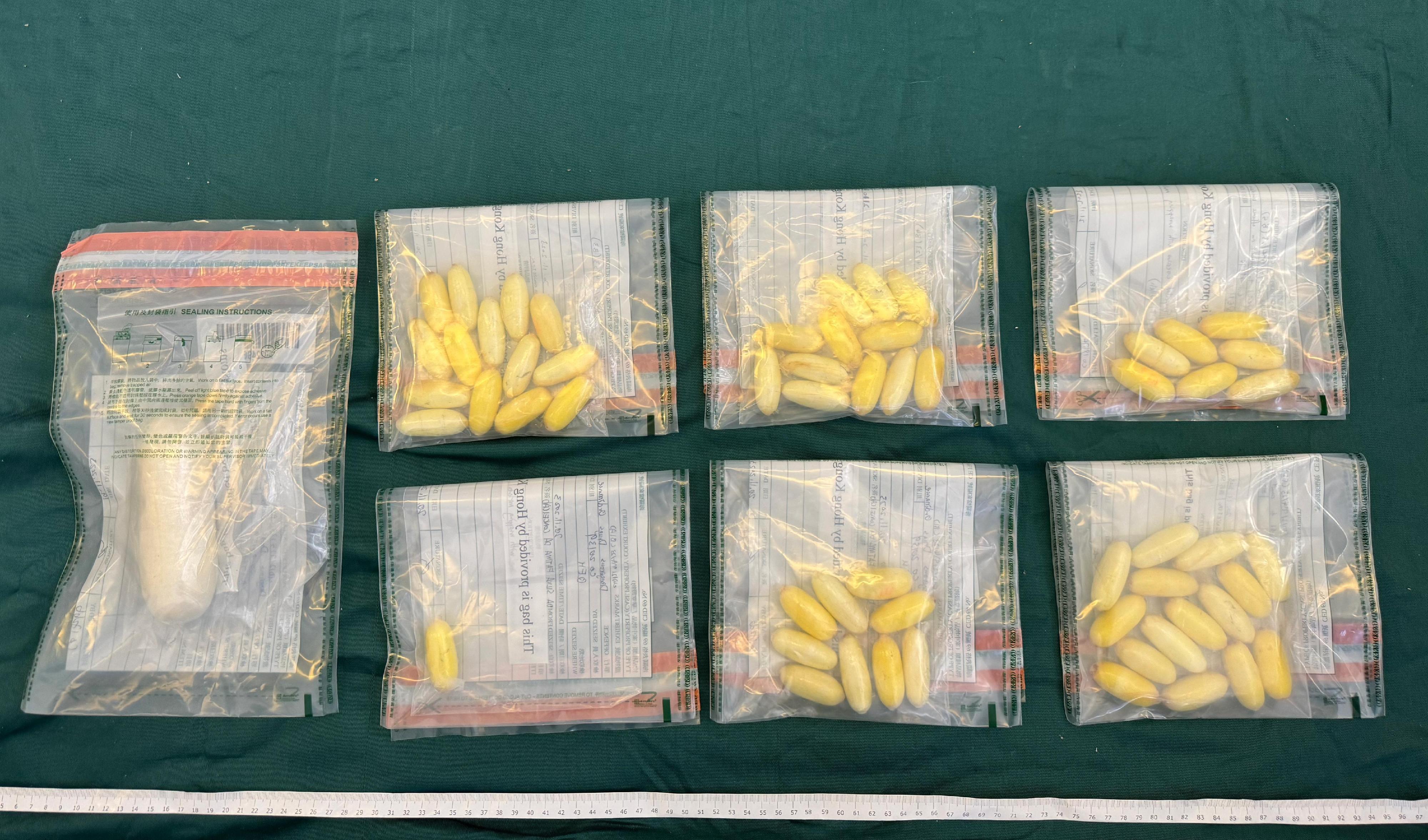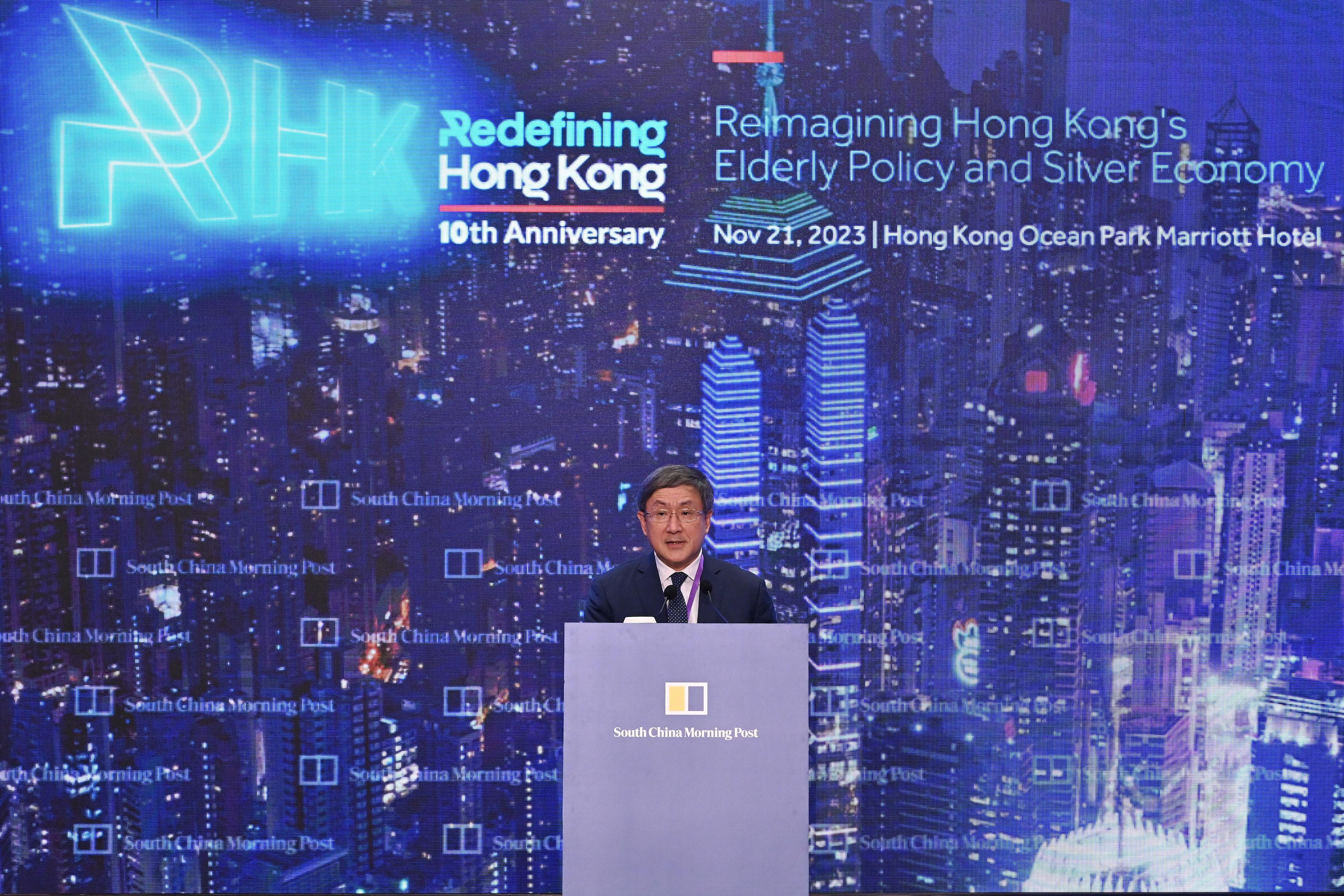Following is the speech by the Deputy Chief Secretary for Administration, Mr Cheuk Wing-hing, at the South China Morning Post (SCMP) Redefining Hong Kong Series 2023 on "Reimagining Hong Kong’s Elderly Policy and Silver Economy" today (November 21):
Tammy (Editor-in-Chief, SCMP, Ms Tammy Tam), Kevin (Chief Operating Officer, SCMP, Mr Kevin Huang), Donald (Chairman, Elderly Commission, Dr Donald Li), Jeff (Partner, Financial Services Leader, Greater China and ASEAN People Advisory Services, Ernst & Young, Mr Jeff Tang), E K (Professor of Public Health and Director of the Centre for Health Systems and Policy Research, the Chinese University of Hong Kong, Professor Yeoh Eng-kiong), distinguished guests, ladies and gentlemen,
Good morning everyone. I am delighted to join you for this inaugural forum on Hong Kong's "silver population" of which I am a member.
May I first take this opportunity to congratulate the South China Morning Post on celebrating its 120th "birthday" earlier this month. The life expectancy of our citizens has not reached that level yet – but we do have one of the longest life expectancies in the world, over 81 years for men and over 87 for women. At the same time, as highlighted by the Chief Executive in his Policy Address delivered last month, our birth rate was at a record low of 0.9 in 2022.
Currently, there are about 1.64 million people aged 65 or above in Hong Kong, representing about 22 per cent of our population. According to the latest projections by the Census and Statistics Department, the number of elderly persons will increase to 2.75 million in 2046, or about 34 per cent of Hong Kong's population.
All these figures speak to the magnitude and complexity of the challenges facing our society; but there are many opportunities too, which I will come to a little later.
In line with the policy direction of promoting "ageing in place as the core, with institutional care as back-up", the Government has launched a wide range of initiatives to address the diverse needs of various segments of our elderly population. Our policies also provide a solid foundation for private sector participation.
Our priority is to ensure that the frail elderly have access to long-term care (LTC) services. The Government, in recent years, has explored more diversified and quality choices of LTC services through public-private partnership. For example, under the principle of "money following the user", we launched the residential care service voucher (RCSV) and the community care service voucher (CCSV) for the elderly. Voucher users may purchase LTC services provided by both non‑governmental and private organisations meeting specific service requirements.
Service providers participating in the RCSV and CCSV schemes offer a variety of residential and community care services, in response to the demand for more flexibility in choosing service providers and value‑added services.
As announced in the Policy Address, starting from the second quarter of next year, we will extend the coverage of the RCSV from care‑and‑attention places to nursing home places. We will also provide 1 000 more vouchers, so that more eligible elderly persons can be admitted to participating residential care homes for the elderly (RCHEs) without waiting. We look forward to more high quality RCHEs joining the scheme, which will bring more variety to subsidised services.
As society advances and the economy grows, today’s elderly population is becoming more financially – and physically – capable than ever before. The evolving socio-economic status of this demographic has spawned new opportunities for elderly service providers.
With increased purchasing power, the elderly population now seeks more sophisticated and comprehensive service packages, above basic requirements. In the light of this shift, the private sector can capitalise on the potential of the silver market by identifying and addressing the specific needs and preferences of this demographic.
The Government welcomes the private sector to develop high-quality RCHE premises. In 2003, we launched the Incentive Scheme to Encourage Provision of Residential Care Home for the Elderly Premises in New Private Developments. Over the past year, we have eased restrictions under the scheme, so that eligible RCHE premises are exempt from paying land premiums up to 12 000 square metres, or 10 per cent of the total permissible gross floor area (GFA) under lease, whichever is the greater. Also, the GFA of the eligible RCHE premises will be exempted from the calculation of total permissible GFA of the entire project. These initiatives will give more flexibility for developers to use the total permissible GFA for other purposes.
We hope the private sector will grasp the opportunity of the silver economy by launching more self-financed community care services and developing high quality RCHEs. This will help to give more options to elderly persons of all kinds of backgrounds, and make Hong Kong’s LTC services more financially sustainable in the long run.
Rapid advances in technology and application of new innovations can also help solve some of the challenges relating to our growing silver population, and improve their quality of life.
In 2018, the Government launched a $1 billion "Innovation and Technology Fund for Application in Elderly and Rehabilitation Care" (I&T Fund). The aim was to better equip the elderly care sector with technological products and solutions. So far, grants totalling about $610 million have been approved, subsidising about 1 800 elderly and rehabilitation service units to procure or rent more than 17 000 technology related products.
To add impetus to this initiative, we will inject an additional $1 billion into the I&T Fund in 2024-25, to enhance subsidies for eligible elderly and rehabilitation service units to procure, rent and trial technology products. Such products include ultra-low beds for medical and nursing care and intelligent anti-wandering systems, with an aim to improving the quality of life of the elderly and persons with disabilities, and reducing the pressure on carers.
Another initiative announced in the Policy Address is the establishment of an Advisory Panel on Silver Economy. This panel will comprise experts from various fields to study and recommend ways that the Government can tap into the business potential of the silver economy.
We hope that, with the Government's support, the gerontechnology market will continue to grow, and that more innovation and technology start-ups will join the bandwagon to design elderly-friendly and innovative products that will transform the ability and ways elderly people age in place.
While caring for the frail elderly, we must not overlook the specific needs and aspirations of the growing number of healthy, active and financially sound members of our silver population. These individuals are often referred to as "young-olds", many of whom have recently retired and continued to exude robust physical health and mental agility. Targeting this group of energetic young-olds, and indeed all elderly persons who choose to age in place, we promote active ageing relentlessly. This approach is critical to their physical, mental and social well-being. Ultimately, our aim is to enable our elderly to remain active, stay healthy, keep fit and above all, embrace a positive mindset.
For example, the Elder Academy Scheme, jointly launched by the Government and the Elderly Commission in 2007, plays an important role in promoting active ageing. Since its inception, this initiative has been offering learning opportunities across a multitude of fields. This scheme extends beyond traditional learning to encourage intellectual stimulation, promote physical health, facilitate social engagement, and foster intergenerational interaction. To date, we have successfully established approximately 200 Elder Academies in primary and secondary schools, as well as in post-secondary institutions throughout Hong Kong.
To demonstrate our commitment to the promotion of active ageing, the Government has pledged to inject an additional $80 million into the Elder Academy Scheme. Even more learning places covering an extensive array of courses will be provided under the Scheme in the coming years to cater to the diverse interests of our elders.
The private sector has ample opportunity to contribute to the silver economy and enrich lifelong learning opportunities for our seniors. Businesses and community organisations can offer a wider spectrum of resources, expertise, and innovative approaches to enhance the learning experience. We invite the private sector to contribute to the continuous learning journey of our elderly. This could be in the form of sponsorship, providing venues for learning, sharing expertise, or developing programmes that align with the interests and needs of our seniors. Such collaboration can significantly broaden the horizons of our elderly, further empowering them to lead active, fulfilling lives.
Complementing the Elder Academy Scheme is the Opportunities for the Elderly Project. This strategic initiative champions active ageing by inspiring our elderly to contribute to society, engage in personal growth, and maintain a healthy lifestyle. The project provides avenues for our elderly to stay physically fit, socially involved, and mentally invigorated. It emphasises the positive aspects of ageing and highlights the valuable contributions our elderly can and indeed do make to society.
In terms of providing financial protection for the elderly, the Government has launched a range of financial schemes to safeguard the income of the elderly after retirement. We issued the first Silver Bond in 2016, to provide a safe and flexible investment option for senior citizens. A key feature of the bond is that its interest payments are linked to inflation, with a minimum guaranteed interest.
Silver bonds have been well received by the market. So far, we have issued a total of eight batches of silver bonds with a cumulative issuance size of HK$157 billion. And, since 2021, the eligible age of subscription has been lowered from 65 to 60.
Another initiative is the HKMC Annuity Plan, introduced by the Hong Kong Mortgage Corporation Limited in 2018. The Annuity Plan helps senior citizens with risk management through a life annuity. Over the past five years, the Annuity Plan has helped about 15 000 senior citizens transform HK$13.6 billion of savings into lifelong income streams to support a worry-free retirement.
Ladies and gentlemen, I have mentioned some of the ways that the Government is addressing challenges related to our rapidly ageing population. We also encourage the private sector to get more closely involved in providing solutions and helping to develop the huge potential of the silver economy.
The HKSAR Government is determined to make Hong Kong a society in which our elderly are treasured. While we have made considerable effort and achieved some progress, a lot more has to be done. We need the wise counsel from experts in the relevant sectors to help us chart the way forward. I am sure that there will be tremendous amount of insightful views being exchanged by the panel of experts this morning.
Lastly, to change the subject to something which is also very important to Hong Kong, I would like to remind everyone here that the seventh District Council Election will be held on December 10. I urge you to vote on election day to elect patriotic, committed and capable District Councillors for the good governance and well-being of Hong Kong. Thank you very much and I wish you all a very successful forum.

